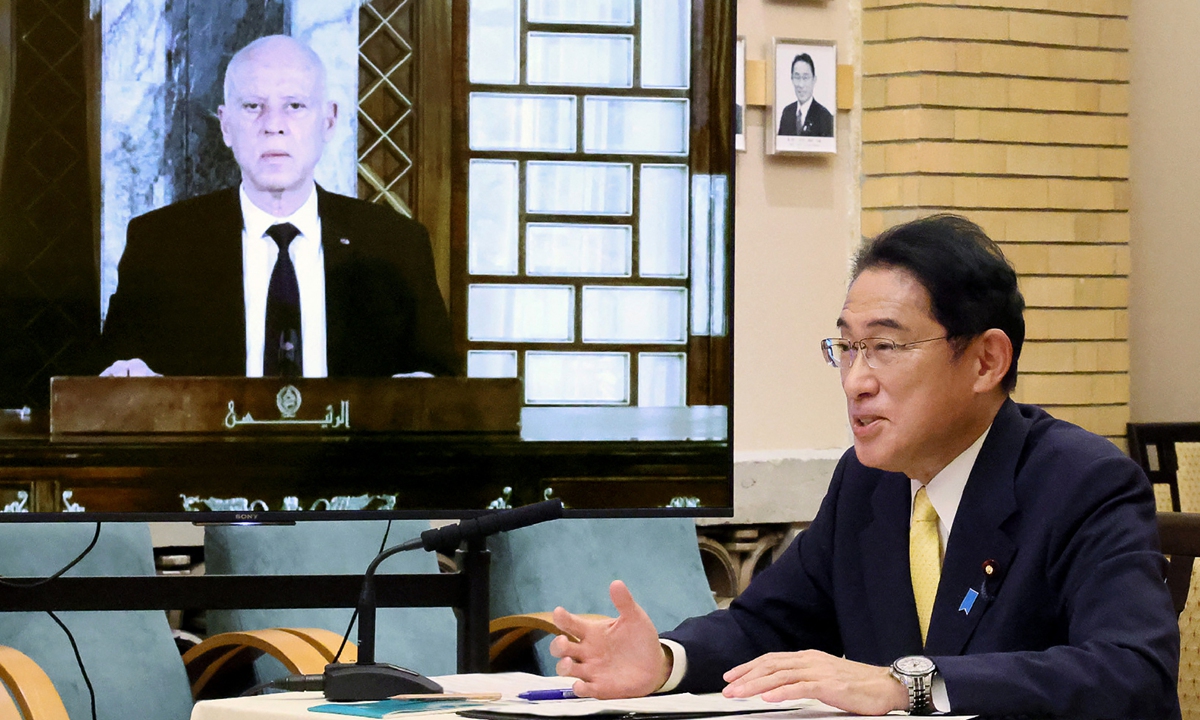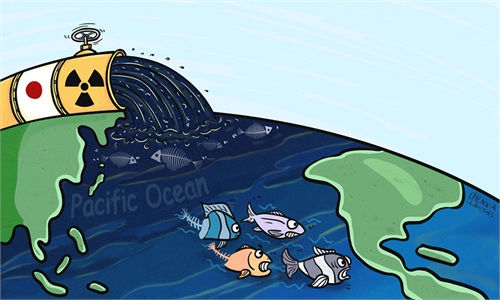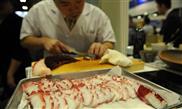Japan offers ‘generous aid’ to Africa with selfish intention, sows discord through ‘China debt trap’ hype

This handout picture taken on August 26, 2022 and released by Cabinet Public Affairs Office of Japan via Jiji Press shows Japanese Prime Minister Fumio Kishida (right) holding an online meeting with Tunisian President Kais Saied at the prime minister's official residence in Tokyo. Photo:AFP
Tokyo appears to be actively joining the US-led malicious discourse system of "China's debt trap theory," which has also become the basis for endlessly slandering China and smearing the Belt and Road Initiative (BRI), as Japanese Prime Minister Fumio Kishida on Saturday pledged $30 billion over the next three years for African development in an apparent effort to counter China's normal engagement with the continent.While more cooperation and aid to Africa is welcomed, Chinese observers criticized that Japan and some other Western countries have highly politicized the so-called assistance with aims to sow discord between China and Africa, contain China, and profit from there. They also warned Japan's continuous provocations against China would shake the foundation of bilateral ties.
In his online speech to the latest round of international conference on African development known as TICAD in Tunisia - the eighth of its kind attended by Japanese and African leaders, Kishida stressed that Japan will grow together with Africa, differentiating Tokyo's approach from that of Beijing, the Japan Times reported on Sunday.
The aid will focus on investing in human capital and fostering quality growth in the continent, according to the report.
Also, Kishida expressed his willingness to strengthen cooperation with African nations in reforming the UN Security Council and realizing a "free and open Indo-Pacific," the report said.
On the sidelines of the leader's meeting, Japanese Foreign Minister Yoshimasa Hayashi met with his Tunisian counterpart, Othman Jerandi, on Friday. Hayashi told a joint press event after their talks that Africa's sustainable and steady growth "must not be impaired by unfair and opaque lending." The Japan Times said Hayashi's remark was "in an apparent criticism against Beijing's 'debt-trap' policy, in which debt is used as leverage to gain concessions from borrowing nations."
Since 2005 when Japan sought and failed to become a nation granted a permanent seat on a revamped UN Security Council, Japan began to attach importance to Africa and increased assistance to the continent in an attempt to gain support from 54 African countries to help it join the UN Security Council in the future, Da Zhigang, director of the Institute of Northeast Asian Studies at Heilongjiang Provincial Academy of Social Sciences, told the Global Times on Sunday.
Japan has been using such aid to cultivate Africa's support for its bid for a seat on the Security Council, therein showing how Japan translates economic power into political power, observers revealed.
As Japanese media reported that Japan has shifted the focus of its engagement with Africa over the years, from giving aid to increasing investment with the participation of the private sector, Da noted that Japan is not giving this $30 billion aid for free and the aid usually comes with strings attached. For example, African enterprises and governments have to buy equipment and import goods from Japanese companies during Japanese investment. That is to say, if Africa wants to benefit from Japan, it must also benefit Japan as well, the observer said.
Japan, through such investment aid and smears on China's aid in the continent, is following the US to expand Western infrastructure coverage in developing countries, which is also a part of a global containment strategy against China, Qian Feng, director of Research Department, National Strategic Institute, Tsinghua University, told the Global Times.
The expert noted that in recent years, some US and other Western politicians and media have been maliciously building a discourse system of "China's debt trap theory." Such a narrative has made headlines in Western media again as Sri Lanka has experienced political turmoil and a change of government due to its domestic economic crisis, with some maliciously asserting that the "Chinese strategic trap" under the BRI has dragged the South Asian country into the political and economic abyss.
Now, Japan plans to place a bet with the $30 billion aid to sow discord between China and Africa through hyping the groundless theory, contain China and profit from the continent, Da criticized.
Wang Wenbin, spokesperson for the Chinese Foreign Ministry said at a press conference on August 18 that the so-called "Chinese debt trap" is a lie made up by the US and some other Western countries to deflect responsibility and blame. Their allegations against China are simply untenable, and developing countries and people with insight from the rest of the international community will not fall for this, Wang said.
Recently, Japan has provoked China in various occasions although the two countries will welcome the 50th anniversary of the establishment of their diplomatic relations in September. Japan seeing its neighbor as a threat rather than a friend and making a series of provocations will shake the foundation of the development of China-Japan relations, Qian warned.
Kong Xuanyou, Chinese Ambassador to Japan said on Saturday at an international symposium hosted by the Chinese Academy of Social Sciences that there are more pessimistic views on China-Japan cooperation. Some believe that China-Japan cooperation has entered a "bottleneck period," and the two countries have shifted from structural complementarity to homogeneous competition, and some believe that economic cooperation should give way to political and security interests, the ambassador said. However, the economic circles of the two countries share the view that the basic framework of China-Japan economic and trade cooperation is still stable and the potential for development is still huge, Kong said.
China-Japan relations are now in a new round of period where conflicts are likely to break out more frequently, and the two sides should be more aware of the risks, honor their promises, properly handle sensitive factors in accordance with the principles of the four political documents and the spirit of the relevant consensus between China and Japan, and avoid jeopardizing the overall situation of bilateral relations, the ambassador urged.




